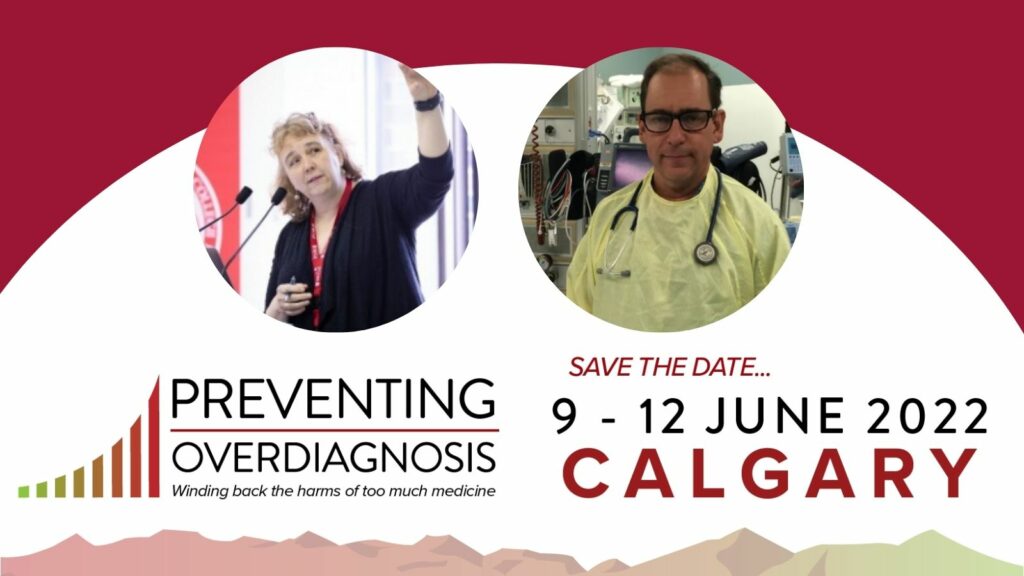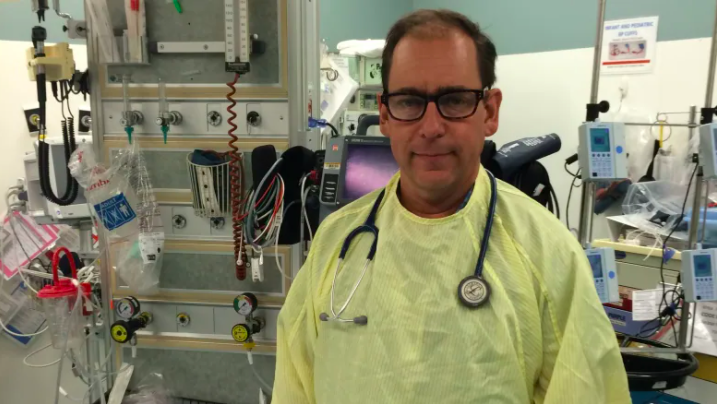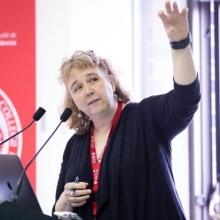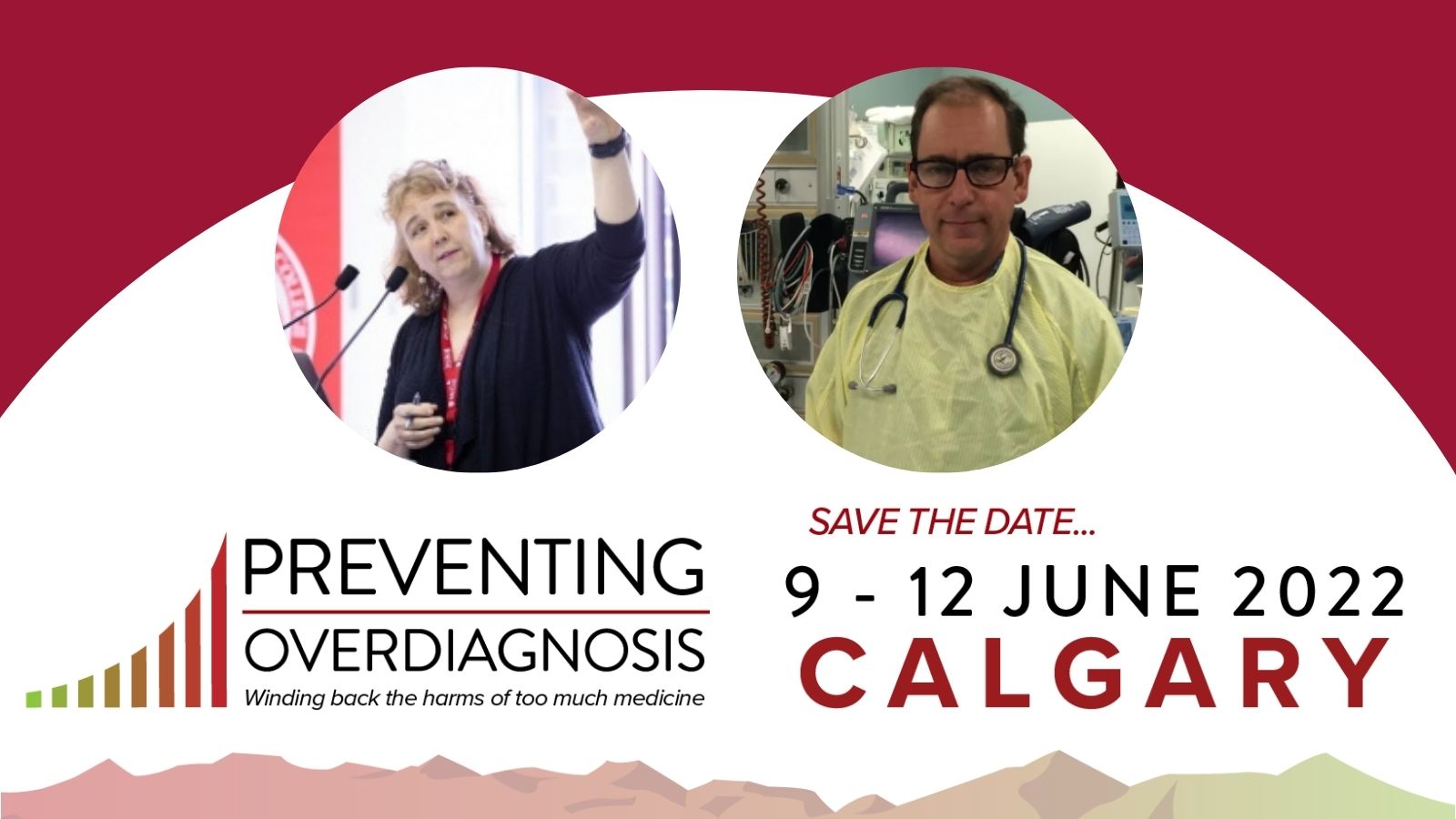
“Overdiagnosis means making people patients unnecessarily, by identifying problems that were never going to cause harm or by medicalising ordinary life experiences through expanded definitions of diseases” – BMJ EBM
Overdiagnosis, or ODx for short, is a significant issue in health care and the topic of a major international conference in Calgary this June, 2022. Task Force members Drs. Eddy Lang and Guylene Theriault are among the enthusiastic organizers of Preventing Overdiagnosis 2022, with the theme of Evidence, Equity and Post Pandemic Health Care. They provide perspectives on why this topic is important and why you should attend the conference, the first in-person event for many of us in more than 2 years.

Dr. Eddy Lang, Cumming School of Medicine, University of Calgary, and Clinical Department Head for Emergency Medicine, Calgary
I am an emergency physician who had little or no knowledge or understanding of the problem of overdiagnosis, like many healthcare professionals. That is, until I joined the Task Force. I was drawn to the Task Force out of an interest in guideline methods and the burden of illness I saw daily in the emergency department (ED) that potentially could be prevented. Soon after joining, I was gob-smacked into an appreciation of how big this problem was. I also began to realize how many patients I was seeing in the ED who were likely victims of ODx and not even aware of the problem.
First time in Canada
With the privilege of being on the Task Force comes responsibility. With the chaos wreaked by COVID-19, the opportunity to apply for the privilege of hosting the conference essentially fell on my lap as the US city that was slated to host on a rotational basis between Europe and Australia had to bow out. We were most fortunate to put forth a successful bid strongly supported by the University of Calgary Cumming School of Medicine, its office of Continuing Medical Education, and the O’Brien Institute for Public Health.
Rampant and insidious threat to global health
The Preventing Overdiagnosis conference is without a doubt the single most important international platform for bringing forth new insight on to the problem of ODx and to propose solutions. I have been lucky to attend 3 previous iterations. While it has been incredibly enlightening, I have found the meetings to be dominated by a sense of frustration from the academic community who attend, noting lots of concerns about how ODx is a rampant and insidious threat to global health but it seemed to me that the meeting was actually quite short on solutions.
Fundamental transformation
Our vision is that the 10th edition of the conference will be transformational, not only shedding light on the widespread nature of the problem, but also attracting the kind of media, citizen, patient and family engagement that will make all healthcare interactions aware of the threats posed by ODx and the means of mitigating the risk. First and foremost, we want Preventing Overdiagnosis 2022 to usher in a new area of health policy interventions and a focused research agenda that will begin to turn back the widespread but greatly under-appreciated harms of ODx to change the fundamentals of all healthcare encounters.
Patient awareness is key
We hope that patients will apply a critical and knowledgeable eye to a wide range of laboratory and imaging tests, especially if ordered in anticipation of a medical problem and not to explain symptoms or concerns. We hope that citizens and providers will pause before applying a diagnosis and think about how certain they are that receiving or providing a “diagnosis”, be it an early cancer or a mental health condition, a finding from lab or imaging testing, will provide more benefits than downsides.
We want people to think more critically about whether they need to pursue a test if there isn’t evidence for it as it could cause more harm than good. It also can mean taking a diagnosis, like thyroid disease, with a grain of salt.

5 Questions with Dr. Guylene Theriault, Clinical Lecturer and evidence-based medicine content expert, Outaouais Campus, McGill University, Co-lead of primary care for Choosing Wisely Canada
A veteran of all the Preventing Overdiagnosis conferences, Dr. Guylene Theriault says this conference is a game-changer in the world of medical conferences. For the first time in more than 2 years, colleagues from across the globe will be able to meet in-person to hear from experts in the field, learn new concepts, challenge ideas and thinking and connect with colleagues new and old.
1. Why did you get involved as an organizer of the POD conference?
More than 15 years ago, I bought a book untitled “Dois-je me faire tester pour le cancer?” from Gilbert Welch”. This book changed forever the way I saw screening and I started to explain the pros and cons of screening to patients. At that time, there weren’t many clinicians who were doing this, so when I saw there was a conference on the subject in 2013 in Dartmouth, I registered right away. Coming back from this event I proposed a 3-hour conference on the topic to colleagues and that got me involved with the Quebec Medical Association, which organized a series of such conferences and the POD conference in Quebec in 2017. That was my first experience on the planning committee of that conference.
2. Why should people attend?
If you like to have your ideas challenged, if you are open to new ways of thinking about what we do in medicine, this conference is for you. You will come out of it with new insights into how to offer better care.
3. Tell us about the importance of the conference
There are just but a few conferences that are game-changing in the medical world. This is one of them. We need to rethink our healthcare and tacking overdiagnosis is an important aspect of this.
4. How does it link to what you do as a member of the Task Force?
There is no screening without overdiagnosis. We need an in-depth understanding of this concept in order to be able to weigh the pros and cons of screening in a comprehensive way.
5. What are you most excited about for this year’s event?
I will have the opportunity to address the participants as a keynote speaker and I view this as a great honour.
As I work for the Task Force, I am a fan of the overdiagnosis conference, I work for Choosing Wisely in tacking overuse and I am involved in teaching evidence-based medicine. To me, these concepts are all convergent so I am eager to hear representatives of all these diverse points of views.
Find out more here about Preventing Overdiagnosis 2022.

